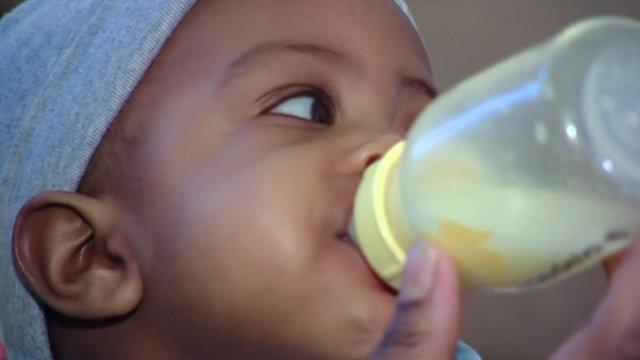'Why I sell my breast milk to strangers'
- Published
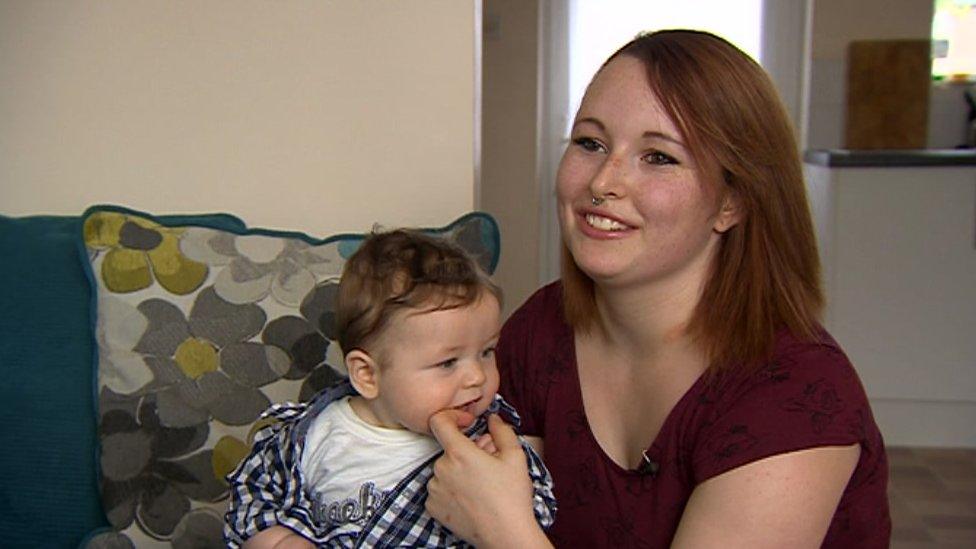
Jade Biddle offered her breast milk for £2 an ounce
The online breast milk business is becoming more and more lucrative, despite health warnings. But why are mothers choosing to sell their milk to strangers?
Jade Biddle is one of a growing number of mothers choosing to sell their breast milk on the internet.
She only started advertising a month ago but she's already getting at least two inquiries a day.
The 22-year-old from Leominster, Herefordshire, got the idea after watching an interview about the issue on television.
"It was in my head from there," she said.
"I thought about donating it to a hospital but there was a screening process and I didn't want to go through that. So I thought 'if I've got it spare, why not?'"
Miss Biddle researched the going rate on the internet - £2 per ounce - and posted an advert on Only The Breast.
The website is branded as "a community for moms to buy, sell and donate natural breast milk." It brings buyers and sellers together but does not sell any milk itself.
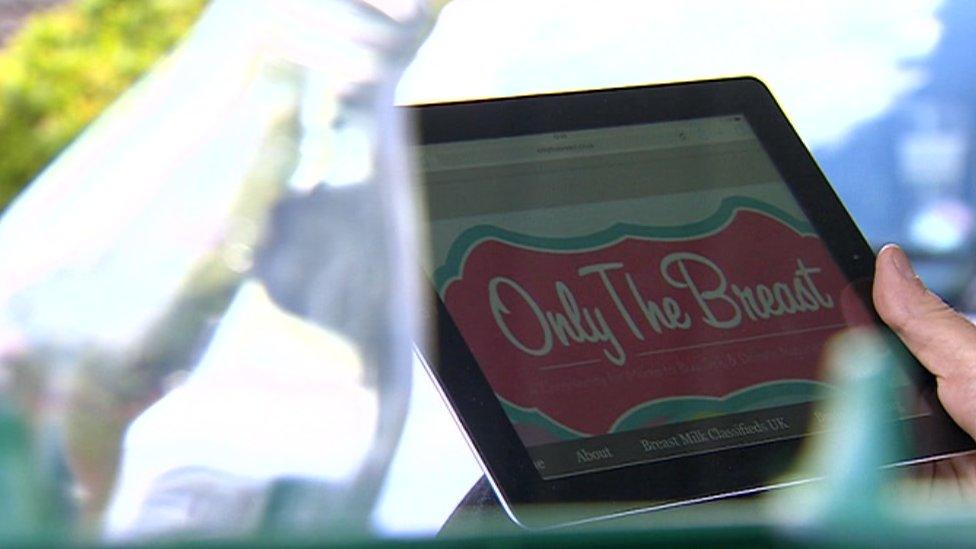
Miss Biddle posted an advert to sell her breast milk on Only The Breast's website
Shortly after posting the advertisement, Miss Biddle made her first sale - £60 for 30 ounces - and gave out her address for it to be collected.
"It was a man in his 50s/60s," she said.
"He knocked on my door and said 'I am here to buy the breast milk'.
"I invited him into the kitchen and asked if he had a cool box. He bagged it up and gave me the money."
Miss Biddle, who gave birth to her son Noah seven months ago, said most of the email inquiries came from men.
She said there had been a mixed reaction from friends and family to her sideline money-maker.
"When I brought it up with my friends they initially thought it was weird," she said.
"They said they could not do it because 'you don't know what's it's being used for'. But as long as it does not involve me I don't really care."
She added: "I plan to do it for as long as possible. If I am still going six months down the line when my son is a year old and I have some spare then I don't see a problem."
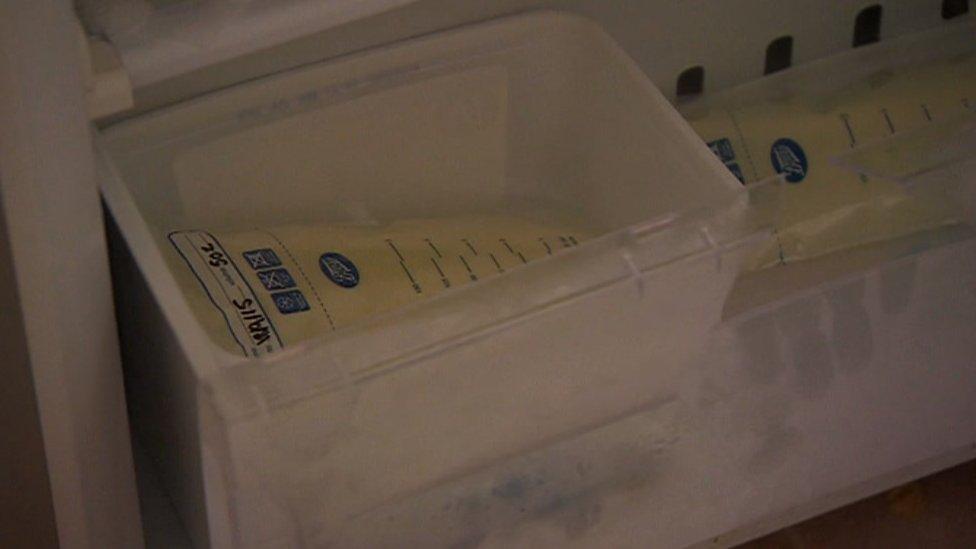
Miss Biddle stores her breast milk in the freezer
Other women who have advertised their breast milk for sale online include Dawn Croxson, from Dorset.
She said: "At first I wasn't in agreement with it because I thought 'you shouldn't charge people for their babies in need' but then.... I thought they're not really in need of it so I thought in that case it was OK to try and sell it".
Meanwhile, another mother of one said she posted her advertisement after hearing stories about parents who had tried to buy breast milk over the internet and later discovered what they were buying was not real.
The 24-year-old from Nottingham, who asked to be known only as Natasha, said: "We have done it in the hope that we can help someone who desperately wants it."
She said the milk - on offer for £1 an ounce - was sitting in her freezer and it made sense to offer it to people who might need it.
But, despite only posting the advertisement a month ago, Natasha said she was already having second thoughts because the majority of her inquiries had come from men wanting the milk for health reasons.
"The idea was to help mothers and families, not to help guys lose weight or achieve other health benefits," she said.
Healthcare professionals have said there has been an increase in buying breast milk online by fetishists, bodybuilders and cancer patients but warn it could be harmful to people's health.
Harmful bacteria was found in breast milk bought online for a BBC investigation
Tests on 12 breast milk samples bought online for a BBC Inside Out investigation found four contained E.coli, two of them contained candida, which causes thrush, and one contained pseudomonas aeruginosa, a bacteria linked to the death of four babies in neonatal units in Belfast in 2012.
A Food Standards Agency (FSA) spokeswoman said selling breast milk online was not illegal. But she said civil action could be taken by local authorities if it was proven it had not gone through the necessary safety checks and this could result in fines.
"The FSA clearly advises against the consumption of breast milk, especially if it has been purchased over the internet," she said.
"Businesses would need to prove the milk had been collected and handled hygienically and the product is free from harmful viruses and bacteria. The FSA's view is that it would be very difficult for a food business to demonstrate the safety of such a product."
She said councils could take action if they found businesses were selling products that were injurious to health.
"While food hygiene regulations cannot prohibit the sale or supply of human breast milk, retailers or websites supplying or selling breast milk products will need to ensure they are safe for consumption."
No-one from Only The Breast was available for comment.
Inside Out is on BBC One on Monday, 12 October at 19:30 BST and on the iPlayer for 30 days thereafter.
- Published18 June 2015
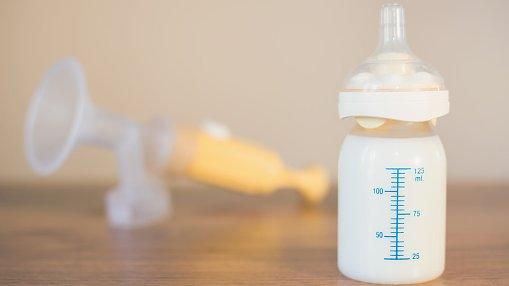
- Published17 March 2014
